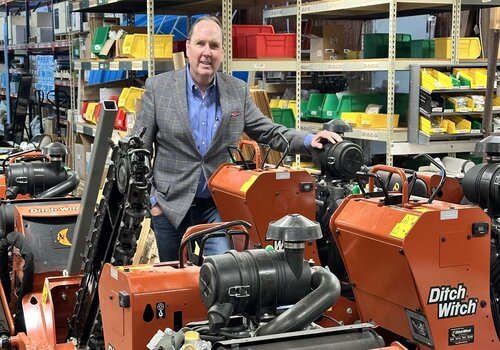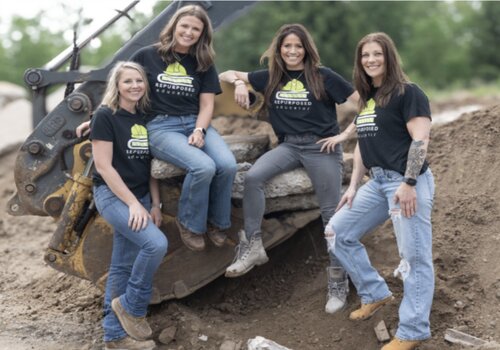When David Woods looks back on his leadership journey, he doesn’t credit titles or degrees for his success. In fact, he had none of the “right” credentials when at 38 years old he was offered the first CEO role at the global underground construction equipment company Ditch Witch. What he did have was the right mindset—and a deep understanding of people.
“I was a really good culture fit for where [the founder] wanted the company to go,” Woods says.
Woods’ journey from the “shyest boy in high school” to CEO, founder and leadership coach was built on the relentless pursuit of doing things better—for companies, for teams and for himself.
Now the CEO of Magellan Executive Partners and Co-Founder of Cortado Ventures, Woods has helped companies scale, teams grow, and leaders transform.
“If you’re still doing everything, you become your own lid," he says. "You’re the reason your company isn’t growing.”
THE LEADERSHIP SKILLS THAT MADE THE DIFFERENCE
Early in his career, Woods didn’t aim for the corner office. He simply raised his hand.
“Year after year, I was just always the one like, ‘I’ll do that.’ Not for glorification, but because the company needed it.”
Another vital trait? Calm under pressure.
“I tried to be the one that lowered the stress in the room,” he explains. “That’s a skill. It’s not something you’re born with.” He cites research showing that high stress can reduce IQ—something he jokes he couldn’t afford. So, he practiced being the person others could count on for clarity and calm.
MAKING EVERY JOB THE BEST JOB
Woods moved around a lot at Ditch Witch early in his career, often taking on roles others considered dead ends. But he saw opportunity where others saw obstacles.
“There were always two things I told myself,” he shares. “One: I’m going to make this look like the best job in the company. And two: Within six months, I need to demonstrate great results.”
His strategy worked. When he became a manager, people wanted to join his department because it was known for being fun, rewarding and productive—even in less glamorous roles.
LEADING THE NEXT GENERATION
Attracting and retaining younger workers, Woods believes, comes down to reputation. “They’re going to ask someone, ‘What’s it like working there?’ Whatever that person says—that’s the truth,” he says.
Want them to stay? Make your workplace “the coolest place in town to work,” he adds. Culture, leadership and opportunity matter more than ever.
“It's going to be a hundred percent based on your reputation as a company, your reputation as a leader.”
HOW TO BE A BETTER LEADER
As CEO of Ditch Witch, Woods helped grow the company from $120 million to $350 million in five years—a trajectory that has continued long after, now surpassing $750 million. He credits that success not to hierarchy, but to alignment and empowerment.
Woods recalls when a team pitched a failed idea that cost the company time and money, Woods didn’t blame the team. He blamed himself—and used it as a teaching moment:
“If you learn anything about leadership, it’s that typically you need to point at yourself if there’s an issue.”
That level of accountability and humility signals a leader who genuinely cares about people’s development, not just their output. This experience was also a lesson to Woods that he needed to do better as a leader.
So, Woods developed a model he calls “strategic filtering”—a way to teach teams to make decisions that align with the company’s goals, without constant top-down direction.
“The process of creating filters aims the brain. People know what fits, and they don’t waste time chasing the wrong ideas.”
Woods is known for mentoring teams to take full ownership of their roles—creating a culture where employees don’t wait to be told what to do. Instead, they learn to say, ‘I’ve got it’ and mean it.
“If you say, ‘I’ve got it," then your manager should never have to ask about it again. That builds trust, and that’s how people grow," he emphasizes.
Empowerment Starts With Trust
Woods sees a direct connection between culture, empowerment and growth. “If you’re running everything, you’re telling your team you don’t trust them,” he says. “You’re going to create churn. People will leave.”
Woods encourages leaders to delegate more freely and view mistakes as opportunities for growth. In his experience, teams will rise to the occasion once they’re trusted with responsibility—sometimes even exceeding expectations and helping the company reach new levels of success.
He encourages all supervisors to try this behavior: “Don’t turn into a micromanager…That’s how you ruin cultures.”
His own firm doesn’t even do traditional employee evaluations. “We have ‘thrive meetings,’” Woods shares. “Employees schedule the meeting, gather feedback and lead the conversation. They own their careers.”
For Woods, leadership—and the “executive presence” that comes with it—starts with building trust.
“You need competence, character and consistency,” he explains “A lot of supervisors miss that last one. If you’re unpredictable—if people are wondering ‘What kind of mood are they in today?’—you lose trust.”
Once you build that trust, you can empower your team. Woods loves turn projects over to people who work for him. I say, ‘You’re in charge. I work for you now.’"
WHY CONTRACTORS SHOULD LISTEN
Whether you run a crew of 10 or a company of 1,000, Woods’ message is clear: leadership isn’t about ego, hours worked or being the smartest in the room. It’s about building trust, creating clarity and making space for others to succeed.
“It's a hard thing to begin to let go, but once you see the benefit of doing so, it's amazing how much that that begins to help,” he advises.
Woods doesn’t preach leadership from a distance. He’s lived it—leading global teams, turning struggling departments into top performers, and helping construction professionals develop skills that reduce stress, improve communication and empower workers at every level.
When asked what the one thing a construction leader could do tomorrow to get started on being a better leader, Woods was quick to recommend a mentor.
“Find someone who’s already where you want to go. One sentence from the right person can change the way you think.”












